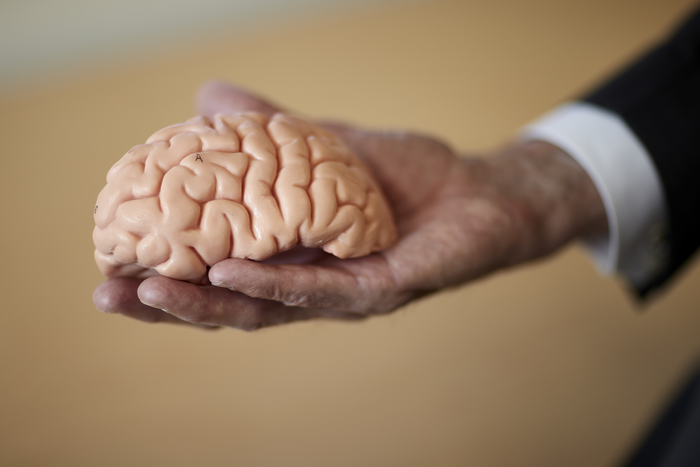Could changing your diet play a role in slowing or even preventing the development of dementia? We’re one step closer to finding out, thanks to a new UNLV study that bolsters the long-suspected link between gut health and Alzheimer’s disease.

Credit: Josh Hawkins/UNLV
Could changing your diet play a role in slowing or even preventing the development of dementia? We’re one step closer to finding out, thanks to a new UNLV study that bolsters the long-suspected link between gut health and Alzheimer’s disease.
The analysis — led by a team of researchers with the Nevada Institute of Personalized Medicine (NIPM) at UNLV and published this spring in the Nature journal Scientific Reports — examined data from dozens of past studies into the belly-brain connection. The results? There’s a strong link between particular kinds of gut bacteria and Alzheimer’s disease.
Between 500 and 1,000 species of bacteria exist in the human gut at any one time, and the amount and diversity of these microorganisms can be influenced by genetics and diet.
The UNLV team’s analysis found a significant correlation between 10 specific types of gut bacteria and the likelihood of developing Alzheimer’s disease. Six categories of bacteria — Adlercreutzia, Eubacterium nodatum group, Eisenbergiella, Eubacterium fissicatena group, Gordonibacter, and Prevotella9 — were identified as protective, and four types of bacteria — Collinsella, Bacteroides, Lachnospira, and Veillonella — were identified as a risk factor for Alzheimer’s disease.
Certain bacteria in humans’ guts can secrete acids and toxins that thin and seep through the intestinal lining, interact with the APOE (a gene identified as a major risk factor for Alzheimer’s disease), and trigger a neuroinflammatory response — affecting brain health and numerous immune functions, and potentially promoting development of the neurodegenerative disorder.
Researchers said their novel discovery of the distinct bacterial groups associated with Alzheimer’s disease provides new insights into the relationship between gut microbiota and the world’s most common form of dementia. The findings also advance scientists’ understanding of how an imbalance of that bacteria may play a role in the disorder’s development.
“Most of the microorganisms in our intestines are considered good bacteria that promote health, but an imbalance of those bacteria can be toxic to a person’s immune system and linked to various diseases, such as depression, heart disease, cancer, and Alzheimer’s disease,” said UNLV research professor Jingchun Chen. “The take-home message here is that your genes not only determine whether you have a risk for a disease, but they can also influence the abundance of bacteria in your gut.”
While their analysis established overarching categories of bacteria typically associated with Alzheimer’s disease, the UNLV team said further research is needed to drill down into the specific bacterial species that influence risk or protection.
The hope is to one day develop treatments that are customized for an individual patient and their genetic makeup, such as medications or lifestyle change. Studies have shown that changes in gut microbiome through probiotic use and dietary adjustments can positively impact the immune system, inflammation, and even brain function.
“With more research it would be possible to identify a genetic trajectory that could point to a gut microbiome that would be more or less prone to developing diseases such as Alzheimer’s,” said study lead author and UNLV graduate student Davis Cammann, “but we also have to remember that the gut biome is influenced by many factors including lifestyle and diet.”
Publication Details
“Genetic correlations between Alzheimer’s disease and gut microbiome genera” was published this spring in Scientific Reports.
In addition to faculty, undergraduate, and graduate student researchers from NIPM, scientists from the UNLV College of Sciences, UNLV School of Dental Medicine, UNLV School of Integrated Health Sciences’ Department of Brain Health, Kirk Kerkorian School of Medicine at UNLV, Columbia University, and University of Texas Health Science Center at Houston contributed to the study.
Journal
Scientific Reports
DOI
10.1038/s41598-023-31730-5
Method of Research
Meta-analysis
Subject of Research
Cells
Article Title
Genetic correlations between Alzheimer’s disease and gut microbiome genera
Article Publication Date
31-Mar-2023
COI Statement
The authors declare no competing interests.




